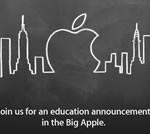
Education-technology advocates took notice when the late Apple CEO Steve Jobs called the textbook industry “ripe for destruction” in his official biography. On Jan. 19, school technologists might just see what Jobs had in mind.
A flurry of speculation about Apple’s entry into the digital textbook market swept across Twitter, Facebook, and technology blogs after Apple released an invitation touting an “education announcement at the Big Apple” Wednesday afternoon.
The event will start 10 a.m. on Jan. 19 at New York City’s Solomon R. Guggenheim Museum.
Observers and bloggers who track the technology giant’s every move said they expect the unveiling of an iBookstore that would operate like iTunes, Apple’s music store. The announcement is not expected to include any new Apple hardware like the much-anticipated iPad 3.
In Jobs’s official biography, penned by Walter Isaacson, Jobs mentions the U.S. textbook industry as one “ripe for destruction,” Isaacson wrote.
The “idea was to hire great textbook writers to create digital versions, and make them a feature of the iPad,” Isaacson wrote. “In addition he held meetings with the major publishers such as Pearson Education, about partnering with Apple.”
Three months after Jobs succumbed to cancer, it’s unclear how Apple will enter the growing digital textbook industry, but it’s become clear that the company is focused on expanding its reach, according to Jordan Golson, an editor for MacRumors, a blog that tracks Apple news.
“It seems likely that Apple will work with existing textbook makers to build interactive iPad editions of existing textbooks, rather than Apple hiring textbook writers directly and offering the content for free. Apple loves to be disruptive, but the company hasn’t turned into a publishing company like Amazon has,” he said. “Just because Jobs had the idea, doesn’t mean Apple will follow it to the letter.”
Neil Hughes, associate editor for the blog Apple Insider, cautioned educators about buying into speculation that Apple will introduce a web-based book store that will instantly revolutionize the textbook market.
And Apple officials should be wary of declining school and campus budgets before they target the academic textbook industry, Hughes said.
“This is a time when schools are cutting back on budgets, they’re not spending a ton of money,” he said. “How well received that will be is hard to say because this is a tough economic time and schools are feeling the squeeze from top to bottom.”
Schools and colleges, Hughes said, could pay a flat annual fee for textbook updates instead of purchasing a new batch of books every time changes are made, even if those alterations are only a few sentences in an entire book.
Golson said it’s fair to expect Apple products to take off in higher education because of the company’s popularity among young people. The company, however, will have to lure those who control school purse strings before a program or product gains traction on campus.
“The fact that the iPad is popular amongst college students helps, but it needs to be popular amongst the educators as well,” Golson said.
Apple has made inroads into K-12 schools and colleges in recent years as many iPad tablet pilot programs turned into full-blown initiatives and faculty and students used resources from iTunes University to supplement classroom lessons.
The iPad has proved more popular in higher education than other tablet computers largely because the device is more accessible for blind students than other tablets, especially early iterations of Amazon’s Kindle.
Introduced in 2007, colleges and universities worldwide have created private iTunes U accounts where students can access educational video, audio, and PDF files. The website has more than 350,000 downloadable items, according to Apple.
Some in the technology world have been anticipating a January announcement from Apple since early December.
Clayton Morris, a renowned blogger on technology-related issues, said in December that the New York announcement “has been in the making for years” and will involve iTunes U.
Morris said Jobs was “intimately involved with this project before his passing.” He added that the announcement will be “small in size but large in scope.”
- Research: Social media has negative impact on academic performance - April 2, 2020
- Number 1: Social media has negative impact on academic performance - December 31, 2014
- 6 reasons campus networks must change - September 30, 2014